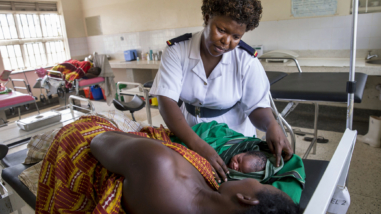International Development Research Centre
For Support Of The Partnership For Evidence And Equity In Responsive Social Systems (PEERSS)
-
Amount$3,500,000
-
Program
-
Date Awarded11/7/2022
-
Term35 Months
-
Type of SupportProject
Overview
The International Development Research Centre funds research in low- and middle-income countries to promote growth and reduce poverty. This grant supports the second phase of the Rapid and Responsive Evidence Partnership. Twelve research centers from low- and middle-income countries across sub-Saharan Africa will respond to inquiries from policymakers within 30 days, helping governments scope problems, find ways to address them, and resolve implementation challenges. These institutions will also work to build bridges between evidence organizations. Through a sharing of tacit knowledge and experiences, this work will accelerate the spread of promising practices for promoting evidence use in the nonhealth Sustainable Development Goals (SDGs) in sub-Saharan Africa. This work advances our Evidence-Informed Policymaking strategy’s goal of governments drawing on timely, relevant information to improve decisions.
About the Grantee
Grantee Website
www.idrc.ca
Grants to this Grantee
for support of the Africa Care Community of Practice
Canada’s International Development Research Centre (IDRC) and Global Affairs Canada launched the Scaling Care Innovations in Africa initiative in 2023. The initiative aims to scale tested solutions to redress the disproportionate share of responsibility for unpaid care work that falls on women and girls. This project grant will support the Africa Care Community of Practice, one of the initiative's three pillars. (Strategy: International Women’s Economic Empowerment)
for Communauté d’Afrique Francophone sur les Données Ouvertes to strengthen capacity & gender equity
As part of Canada’s foreign affairs and development efforts, the International Development Research Centre (IDRC) champions and funds research and innovation within and alongside developing regions to drive global change. It invests in high-quality research in developing countries, shares knowledge with researchers and policymakers for greater uptake and use, and mobilizes global alliances to build a more sustainable and inclusive world. This grant will allow IDRC to continue to advance the use and sharing of data to address critical development challenges in Francophone Africa through the Communauté d'Afrique Francophone sur les Données Ouvertes (CAFDO), consolidating its growing list of achievements since 2017 and leadership role in the regional data community. CAFDO is part of the Data for Development (D4D) Network, a global alliance of Global South-based research organizations funded by IDRC that works to strengthen collaboration and mobilize the knowledge needed to advance the use of data to address critical development challenges. (Strategy: Inclusive Governance)
for support of the Partnership for Evidence and Equity in Responsive Social Systems (PEERSS)
The International Development Research Centre funds research in low- and middle-income countries to promote growth and reduce poverty. This grant supports the second phase of the Rapid and Responsive Evidence Partnership. Twelve research centers from low- and middle-income countries across sub-Saharan Africa will respond to inquiries from policymakers within 30 days, helping governments scope problems, find ways to address them, and resolve implementation challenges. These institutions will also work to build bridges between evidence organizations. Through a sharing of tacit knowledge and experiences, this work will accelerate the spread of promising practices for promoting evidence use in the nonhealth Sustainable Development Goals (SDGs) in sub-Saharan Africa. This work advances our Evidence-Informed Policymaking strategy’s goal of governments drawing on timely, relevant information to improve decisions.


